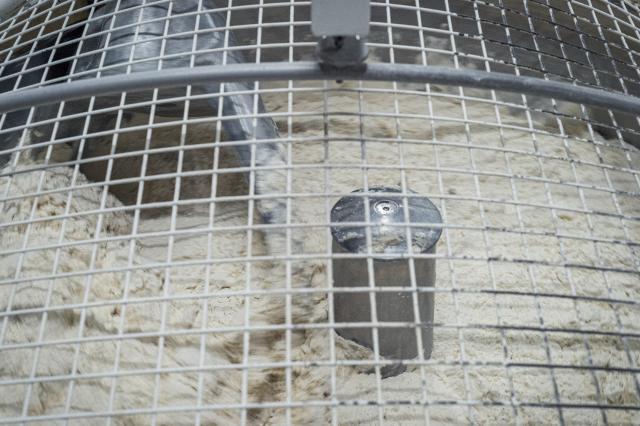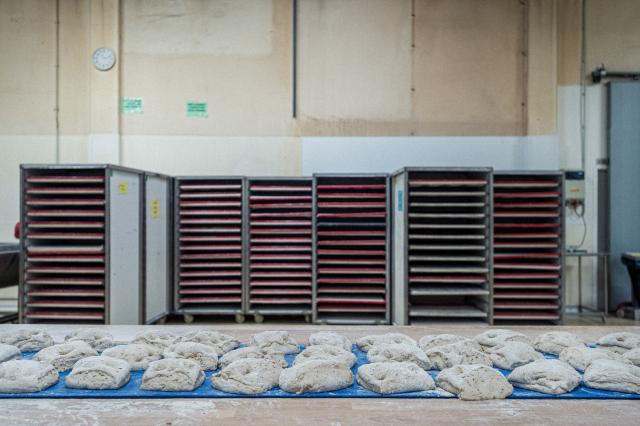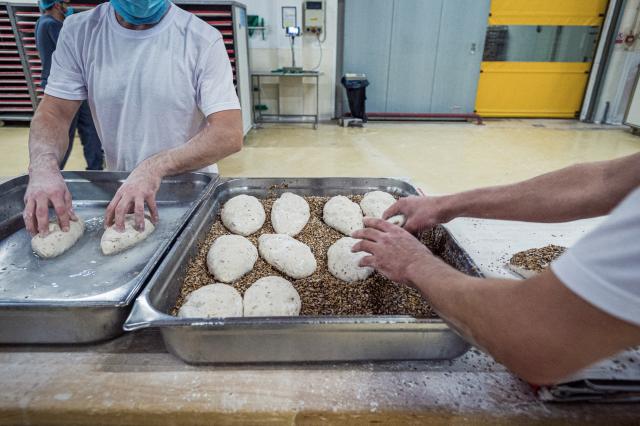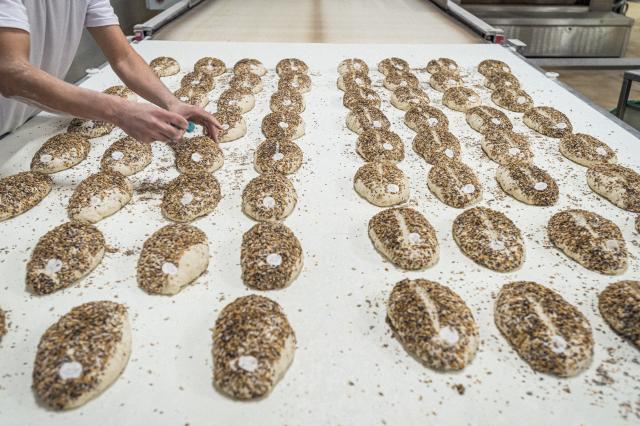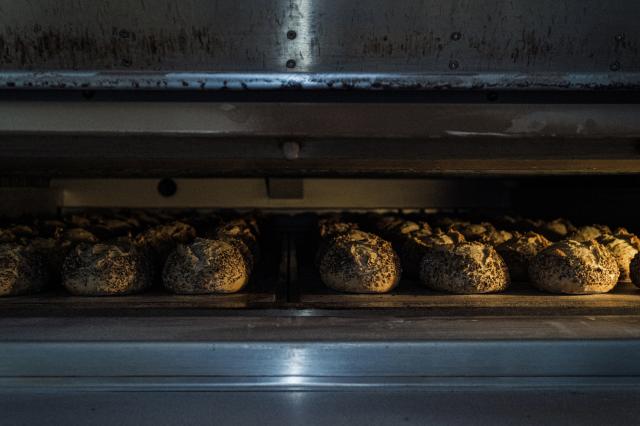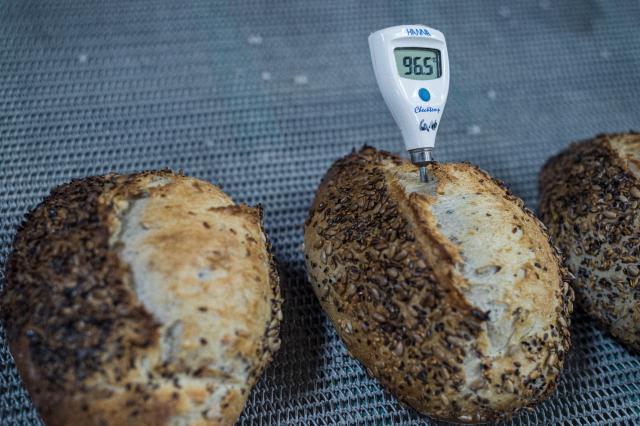Flour in the veins
Sponsored content Switch to French for original article
Traditionally, bread is made with patience and a dough made of natural ingredients and worked by hand. In 2021, however, this is rarely the case. With its "Zesummen fir Eis Bio Baueren" chain, Cactus is fighting this trend. Jean Kircher, a miller from the French Alsace who loves slow baking, is taking on the Luxembourg supermarket.
Once considered healthy, bread has lost its former status. Many people have stopped eating it because they feel bloated or have trouble digesting it. As with most things, its production has evolved with technology. There is no more time, it has to be produced quickly and in large quantity, at the expense of quality. The discourse is the same everywhere. Or almost.
Cactus, in constant search of the best quality and concerned about preserving traditions and the planet, has decided to take a completely different path. In 2019, the Luxembourg supermarket has set up a production chain for 100% regional and organic certified bread called "Zesumme fir Eis Bio Baueren". The baguettes and other products in the bakery aisles are made 'as in the old days' by the label partners with flours ground in organic mills from cereals grown with the utmost respect for our land in mind.


Jean Kircher, the founder of ˈPains & Traditionˈ, is one of them. He has been producing bread for Cactus for 20 years now and has been involved with the BIOG (Bio-Bauere-Genossenschaft Lëtzebuerg) network since its foundation. This is a source of pride for this slow baker who describes himself as an "authentic Gallic resistance fighter" who refuses to give in to modernity and who claims loud and clear that his bread is one of the last in Europe to respect the rules of ancient baking.
It is in Hautcharage in rue Bommel, at the end of an industrial zone, that he welcomes us. In premises that, at first glance, don’t look like a bakery at all. If it wasn't for the logo that highlights pieces of wheat and a mill wheel, you would be quickly fooled. But inside, it's a completely different sight.
Slow Baker
Jean Kircher on slow baking, a movement that aims to revive the methods, values and traditions from 50 years ago.
*in French

The entrance door opens onto a small narrow corridor, tiled in white. Jean Kircher is waiting for us there with a big smile. "Coffee?" He transmits his passion without having spoken about it yet, through an overflow of energy. He embraces the place which he finds himself in. He is at home, part of the furniture. Dressed in a three-piece suit with a work jacket bearing the effigy of his bakery, the 72-year-old man, who stands out because of his headgear, guides us to a small meeting room. "Everyone calls me the man with the straw hat", he laughs. He's a real comic book character.
On the way, he stops at a frame. "Do you know Gaston Vogel? He once published an article in the ˈWortˈ complaining about the quality of bread in general. Then he sent a letter to us, to La Provençale and to others, saying the same thing. We sent him three loaves of bread. Look at his reply." It's all on the wall. Handwritten, the famous Luxembourg lawyer says, "Thank you, thank you, from a baker's son."


Arriving at the meeting table, Jean Kircher sits down, takes a first sip of coffee and tells his story and that of his bakery. "I've been in Luxembourg since '86", he begins. Indeed, he is Alsatian and juggles between French and a few sentences in perfect German. "Basically, I am a miller. I was the boss of the Nonnemillen in Echternach. We have been millers from father to son for nine generations."
The Kircher family is "probably one of the oldest milling families in France". They have been passing on their mill since 1740. At this stage, "we have a little flour in our veins". And it was his father who introduced him to baking, telling him that, as he was destined to take over the family business, "if you want to serve baker customers, you must first learn their trade".
ˈPains & Traditionˈ, boosted by Cactus
Jean became passionate about bread and opened his own small bakery in '98. In addition, the baker now participated in trade shows. He set up a stand where he let passers-by taste his bread… including Cactus, "around 2002". It was love at first sight and at first bite. "They said, 'The bread you have in demo here, can't it be made on a large scale?', and I told them, 'Yes, of course'" and this was the beginning of the success story. "We started with small loaves for restaurants. I immediately served eight of the 12 Michelin-starred restaurants in Luxembourg."
"In the Kircher family, we have a bit of flour in our veins."
The rest is history. Cactus and Jean Kircher's bread hit the spot. Today, ˈPains & Traditionˈ has 6,000m2 of space on two premises (the second is in Mont Saint-Martin, France) from which a truck leaves for Cactus every morning, and a staff of 130 employees, including 80 to 90 bakers, whom Jean describes as "top guns". "In logistics, quality, quality control, in the lab, on every floor… real top guns, I tell you!"
As for him, he no longer puts his hand to the wheel. Today, Jean describes himself as "the guardian of the temple". A temple made possible by "Cactus who was my booster". "It would have been difficult without them. Our love affair has now lasted for 20 years. We trust each other and we move in the same direction, with the same values. It's a joy." But enough chit-chat, "I'm going to show you how bread is made with the human hand. Are you ready to dress up? (laughter)"
The baker hands us a cap, a jacket and disposable shoe covers. Hygiene first. At the end of the entrance corridor, a PVC curtain separates us from the bakery. We put on our disguise, and we penetrate the famous temple of which Jean Kircher is so proud. It is a big hangar with off-white walls, green fir tree material and a mustard ceiling. Any machines? Almost none, but a large team of bakers puts their hands to the dough. It couldn't be more harmonious.


The stations follow one another in the order of the stages of bread making. Everything is clean, well-structured and spacious. "It's simple", explains Jean, "organic is on the left and conventional is on the right." The sourdough that rests in the four corners of the room and the smile and kindness of the ˈPains & Traditionˈ employees make you want to get to work yourself.
First step, the raw materials. "The majority of our flours come from my family mill in Alsace. We make 100% Luxembourg flour there. The wheat comes from here, is processed there and comes back as flour." The others never come from far away either. "We follow a simple rule: we have to be able to drive to each of our suppliers the same day. If I have to fly to get there, there's a problem. Products that come from China are totally excluded from our world." So, the pumpkin seeds on Cactus' organic bread of the same name come directly from Burgenland, Austria.


In addition to the exceptional foods acquired at the source, "the two essential factors for making a real, good bread are water and time. Water, because we need to find the perfect balance so that the dough is good, can be fermented and the flour molecules digested. And time, because you can't make express bread. Well… yes, you can, but it's a crappy bread. It's industrial, it's cheap, but it's not good."
"To do what we do, you need patience. Some people try to imitate us, but, when they get to the end, they realize how annoying, complicated, slow it is… It’s really tedious, to put it plainly (laughs), but that's our commitment. Making good bread is an art. You can't become a baker just because you read three things on Google."
And, for Jean, the art of making bread means following traditions. Just as a pizza maker will never put pineapple on his pizza, he will never use machines to make his dough. So "here, everything is done by hand, by human beings, and, while a baguette can be made in 45 minutes by an industry professional, we take 6 to 8 hours to make it. Between the two, there is something going on…"
Tradition
Jean Kircher about the difference between his bread and the others.
*in French

The key step, often ignored by industrial bakeries, is the most time-consuming: kneading. "Yeast time, hydration, kneading time", recites Jean Kircher like a walking encyclopaedia. The first fermentation is called pointing. "It takes us up to 4 hours, with a manual flap every hour. For me, that's when the aroma and taste develop. Others do it in 20 minutes… at best."
Once his dough – which also has a much healthier dosage than modern bread, with notably 10 times less yeast – is well kneaded, it's time to weigh and divide. This is the only place where ˈPains & Traditionˈ uses mechanical means. "But very softly, just to divide. We shape by hand. The manual process ensures that our little balls of dough are aerated. The machines, on the contrary, turn them into something rubber-like."
At the next booth, two bakers add their finishing touches to the organic seed breads. The first one takes the balls of dough, dips them lightly in water and lays them in a green tray filled with seeds and grains of all kinds. The second one takes it out, puts an edible logo of the bakery on it and puts it in the cart that will take it to the next stage: baking. "But before going into the oven, all the doughs are reshaped two or three times. The dough has to be in the right place for the gas production to develop harmoniously."
Making a bread that has a beautiful shape is a challenge when you follow the way of doing things from 50 years ago to the letter. "Our dough is fragile because it contains much more water. So, if it lies on its side, it will make a misshapen loaf. We don't use any chemical or synthetic ingredients or enzymes to help us. Everything is 100% clean: flour, water, salt, sourdough, yeast, and that’s it. We are the cleanest bakery in Europe. I'm convinced of that. Nobody works like we do. So, while others are putting ˈexplosivesˈ in the stuff – poof! -, some crap to magically make nice big balls, we're constantly repositioning them."
Finally, the ˈPains & Traditionˈ breads go into the oven. "The best in the world, made in Luxembourg. They are stars." However, they are only baked at 75% to 80% before going into their cold storage box – "the only stage where we give in to modernity, but we do just-in-time production rather than storing them". Not cooking them at 100% allows the company to "supply the whole world".
Cactus has "exclusivity in supermarkets in Luxembourg" and Jean trains their employees so that they know how to finish cooking "just right", but "we also deliver to a lot of restaurants, in the country and abroad. We are the elite of the French Riviera. We are also in Qatar, Japan, Moscow…". In fact, "one day, a starred chef told me that his clients ate a lot of my bread. I said to myself, 'Put more food on their plate and they will eat lessˈ… The last time, he served me half a pigeon!"
Just like this anecdote that testifies to his outspokenness, Jean Kircher is never short of stories that make you smile. In his company, time does not pass. Our visit is already over. An exceptional host to the end, he hands us three loaves of bread. "No one leaves our house empty-handed. Two 'Pains à l'Ancienne Blancˈ, one 'Bio Pain Oméga 3'. And he was right. To taste his bread is to adopt it.



